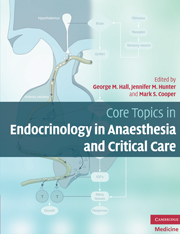Book contents
- Core Topics in Endocrinology in Anaesthesia and Critical Care
- Core Topics in Endocrinology in Anaesthesia and Critical Care
- Copyright page
- Contents
- Contributors
- Foreword
- Preface
- Section 1 Perioperative care of patients with endocrine disease
- Chapter 1 Anaesthesia for patients with pituitary disease
- Chapter 2 Thyroid disease
- Chapter 3 Parathyroid disease
- Chapter 4 Adrenal disease:
- Chapter 5 Pancreatic neuroendocrine tumours including carcinoid
- Chapter 6 Multiple endocrine neoplasia
- Section 2 Perioperative care of the patient with diabetes mellitus
- Section 3 Endocrine disorders in the critically ill
- Index
Chapter 6 - Multiple endocrine neoplasia
from Section 1 - Perioperative care of patients with endocrine disease
Published online by Cambridge University Press: 06 July 2010
- Core Topics in Endocrinology in Anaesthesia and Critical Care
- Core Topics in Endocrinology in Anaesthesia and Critical Care
- Copyright page
- Contents
- Contributors
- Foreword
- Preface
- Section 1 Perioperative care of patients with endocrine disease
- Chapter 1 Anaesthesia for patients with pituitary disease
- Chapter 2 Thyroid disease
- Chapter 3 Parathyroid disease
- Chapter 4 Adrenal disease:
- Chapter 5 Pancreatic neuroendocrine tumours including carcinoid
- Chapter 6 Multiple endocrine neoplasia
- Section 2 Perioperative care of the patient with diabetes mellitus
- Section 3 Endocrine disorders in the critically ill
- Index
Summary
- Type
- Chapter
- Information
- Publisher: Cambridge University PressPrint publication year: 2010

